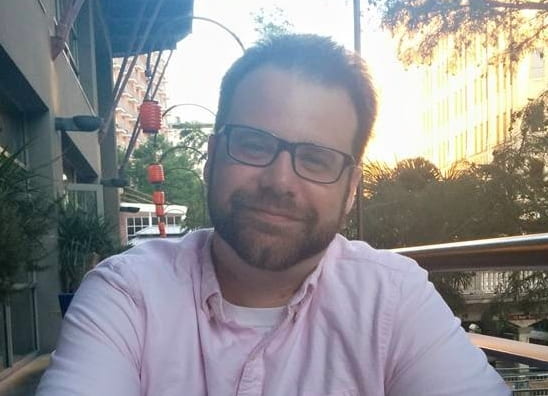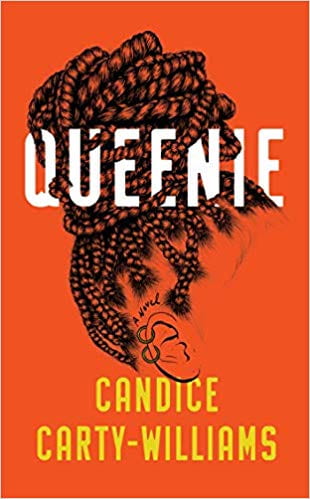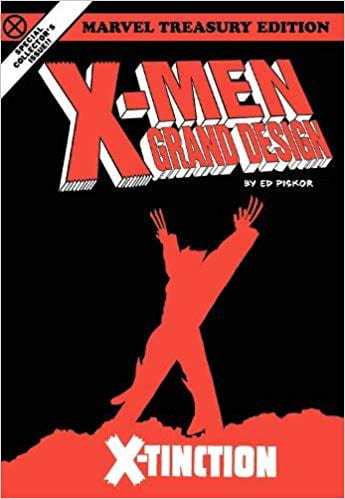CATCHING UP WITH JACKSON AYRES (PH.D. ’13),
ASSOCIATE PROFESSOR OF ENGLISH AT
TEXAS A&M UNIVERSITY–SAN ANTONIO

In this interview, Jackson Ayres (Ph.D. ’13), a recently tenured faculty member at Texas A&M University–San Antonio, updates us on his recent trip to London to present at a conference on George Orwell and on Jack’s participation in the reorganization of his academic department (one goal being a decolonized major). He also offers advice to our current graduate students on how to prepare for the job market, and he gives some enticing book and film recommendations, as well as an endorsement for a website that Jack describes as “a forum for thinkers in the humanities and social sciences to put their work toward addressing big questions.”
What has been the most interesting professional experience you’ve had in the past year?
I’m fortunate to have had several interesting and rewarding professional experiences this past year. Two, in particular, come to mind.
First, in May 2019, I presented at “Rebel? Prophet? Relic? Perspectives on George Orwell,” a conference hosted by University College London and sponsored by the Orwell Foundation. As someone who is (slowly) working on a major project related to Orwell, I appreciated meeting and learning from so many others who are also interested in Orwell’s writing and legacy. It was extra special to do this in a conference space literally across the street from the hospital in which Orwell died. UCL, moreover, holds Orwell’s archive, and participants were invited to look at the materials. Thumbing through an early draft of 1984 with Orwell’s marginalia was pretty incredible.
Second, my academic unit was recently reorganized into a new, multidisciplinary department, and my colleagues and I have spent this past year working on our strategic plan, bylaws, and revised curricula. During this process, we committed to the idea that teaching at a Hispanic-serving institution means being especially attuned and accountable to higher education’s colonial histories, and how colonial practices are (often unintentionally) perpetuated. We have been putting those commitments into practice, working to conceptualize, design, and realize a decolonized major and department. It’s ongoing and difficult work, but it’s certainly been a meaningful process so far.
What is the most crucial advice–especially with regard to developing or promoting one’s professional skills–that you can give our current graduate students in English before they go on the academic and/or alt-ac job market?
I think it’s imperative that graduate students recognize that they’re on the market, so to speak, as soon as they accept admission into their program. Put another way, the notion of “going on the market” is misleading when seen as its own discrete stage, entered during the final year before graduation. Obviously, there are some specific tasks—like submitting applications and, hopefully, interviewing—that are done during that last year, but conceptually it’s crucial to think about yourself as being on the job market from the get-go. My point is that looking for and applying to positions is not some topper that comes after graduate coursework and a dissertation. Rather, the work done during the program is continuous with the work that you aspire to do after the program.
Obviously, there are some specific tasks—like submitting applications and, hopefully, interviewing—that are done during that last year, but conceptually it’s crucial to think about yourself as being on the job market from the get-go.
All of this is to say that my advice for graduate students is to be intentional: know why you are getting a degree, speak with mentors and fellow grad students about how to make sure your work is aligning with and supporting your goals, and understand that the work that you do from day one is contributing toward your desired intellectual and professional profiles, which in turn will then be yours to match with post-graduation opportunities. I should qualify that at the same time that you move through the program intentionally, it’s important to be willing to change course or follow through on unexpected opportunities. Flexibility, adaptability, and openness to change are vital.
In short, proceed through the program with purpose, and make decisions (which courses to take, faculty to work with, professional experiences to pursue) that contribute to that purpose. You will only have the right post-graduation profile if you consider goals and job searches from the start, even if those goals and pathways evolve considerably over the course of your graduate education.

What is one author, book, website, or movie you’d recommend, and why?
I have lots of recommendations!
My favorite novelist right now is Jonathan Coe. He is an English writer not widely read in the US, but his perceptive state-of-the-nation novels are witty and humane, and their portraits of English life resonate with our current American experience. His two most recent novels, Number 11 and Middle England are sober dissections of Brexit Britain. Both are sequels to other novels but can be read independently as well. Also, over the summer I read Queenie, by Candice Carty-Williams. Queenie has been described as “Black Brigit Jones’s Diary,” which is an obnoxious simplification, but it does gesture at how the novel adheres to conventions of romantic comedy or “chick lit” while making visible that genre’s whiteness. The book is also honest and wry, and interestingly integrates contemporary forms of communication like texting and email into the formal texture of the novel.
And since I am a huge comic book fan, I really appreciated cartoonist Ed Piskor’s series, X-Men: Grand Design, which concluded in July. Piskor takes 30-some-odd years of X-Men serialized continuity and assimilates it into one bizarre, maximalist narrative that reads like a series of loosely linked summaries. Even as his comic retells famous stories from X-Men’s narrative history, Piskor’s quirky, underground comix-influenced visual style defamiliarizes those older stories. What I think that I most like about Grand Design, though, is its implicit championing of superhero comics’ inaccessibility to new readers. Part of the pleasure of entering into the serialized worlds of superhero comics is the initial confusion and disorientation caused by stepping into a fictional universe with years’ worth of strange, contradictory backstory—and then making some sort of sense out of it all. Piskor’s project is a celebration of this facet to comics readership and fandom.
Shifting gears, I really appreciate the website Public Books, a forum for thinkers in the humanities and social sciences to put their work toward addressing big questions. Its essays show that humanities scholarship, far from being insular and arcane, bears on matters of public concern and everyday experience. I learn a lot from the site and get lots of book recommendations from it.
Lastly, the movie that I was most excited to see over the summer was Once Upon a Time … in Hollywood. I am an unashamedly huge fan of Quentin Tarantino, so I always get excited for a new release from him and made sure to see Once Upon a Time on its opening day. All of Tarantino’s movies are at some level about movies themselves, and this one is overt about that focus; it’s also an interesting example of his tendency toward historical revisionism. What the movie is actually saying about Hollywood history, however, is not totally clear, and part of me thinks Hollywood is a bit of a red herring, for the movie seems to really be about American masculinity. It’s worth noting that this film is Tarantino’s first after breaking ties with his friend and producer Harvey Weinstein, and that Roman Polanski appears as a minor character in the film. It’s hard, then, not to think about the movie against the backdrop of #metoo as well as Jeffrey Epstein, and in that context the movie’s seeming attempt at recuperating a Sexual Revolution-inflected version of heroic masculinity left me queasy. If nothing else, it left me with lots to think about and it definitely was entertaining. While certainly not Tarantino’s best film, it did not leave me disappointed.


